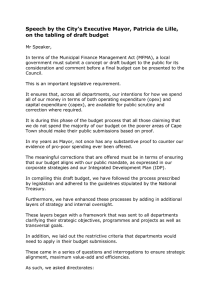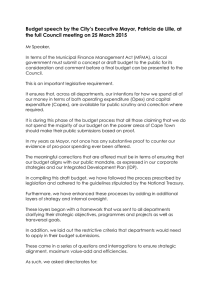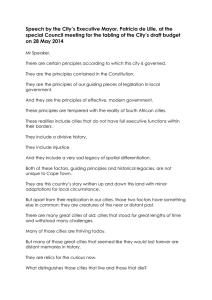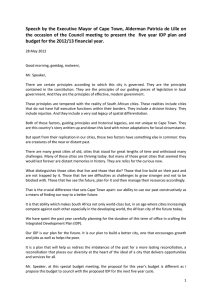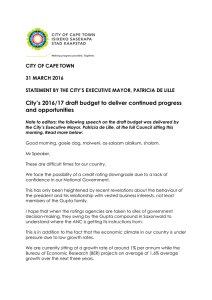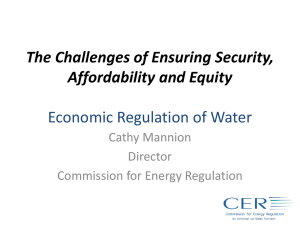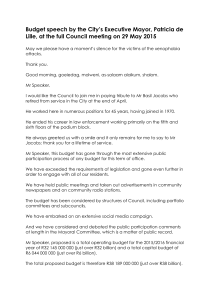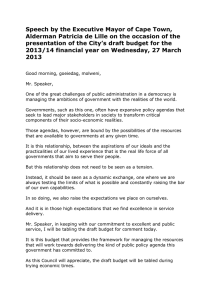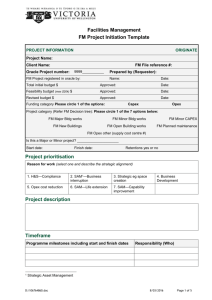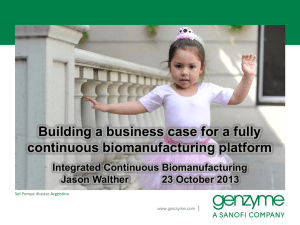Speech by the Executive Mayor of Cape Town,
advertisement
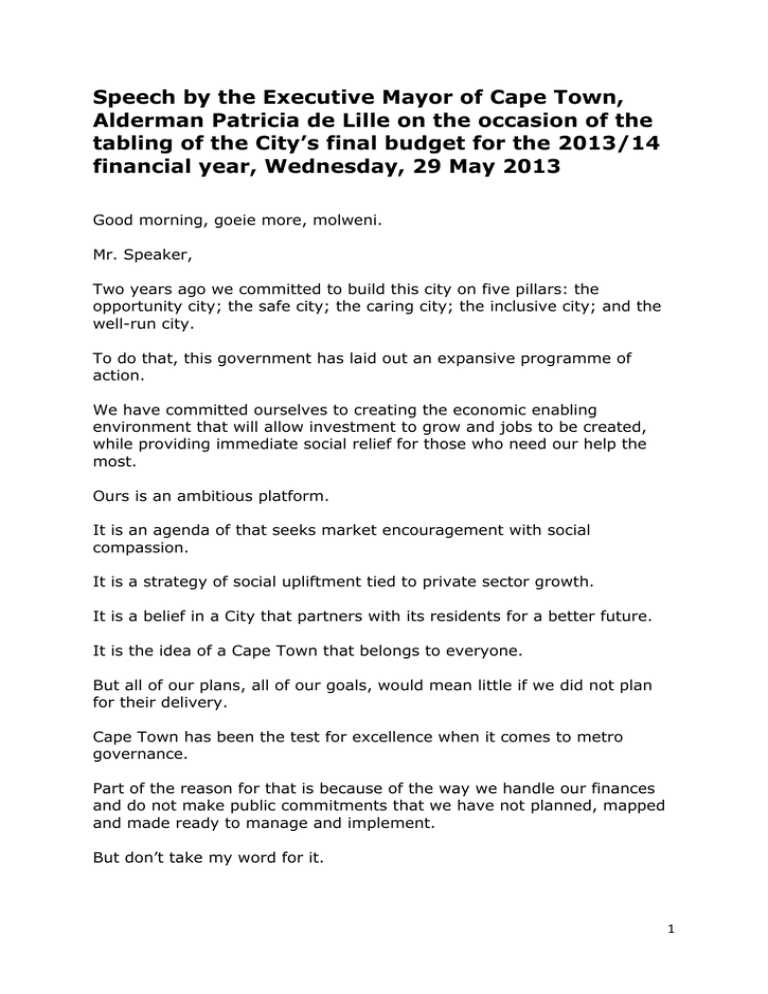
Speech by the Executive Mayor of Cape Town, Alderman Patricia de Lille on the occasion of the tabling of the City’s final budget for the 2013/14 financial year, Wednesday, 29 May 2013 Good morning, goeie more, molweni. Mr. Speaker, Two years ago we committed to build this city on five pillars: the opportunity city; the safe city; the caring city; the inclusive city; and the well-run city. To do that, this government has laid out an expansive programme of action. We have committed ourselves to creating the economic enabling environment that will allow investment to grow and jobs to be created, while providing immediate social relief for those who need our help the most. Ours is an ambitious platform. It is an agenda of that seeks market encouragement with social compassion. It is a strategy of social upliftment tied to private sector growth. It is a belief in a City that partners with its residents for a better future. It is the idea of a Cape Town that belongs to everyone. But all of our plans, all of our goals, would mean little if we did not plan for their delivery. Cape Town has been the test for excellence when it comes to metro governance. Part of the reason for that is because of the way we handle our finances and do not make public commitments that we have not planned, mapped and made ready to manage and implement. But don’t take my word for it. 1 Ask Moody’s, which gives us the highest credit rating in local government in the country- indeed, the only thing keeping our rating down is the sovereign credit rating. Ask the National Treasury, that regards Cape Town as the benchmark for financial excellence. We seek to maintain that reputation, not because of what it means for our egos but because of what it says about the quality of services our citizens receive. Mr. Speaker, it is on that note that I want to present the final budget for the 2013/2014 financial year to Council for consideration. The proposed total budget for 2013/2014 year is R31, 5 billion. Of that, the Operating budget is R26, 144 billion, or just over 82% of the total while the capital Budget is R5, 45 billion, or 17.25% of the total. In the proposed budget, operating revenue has increased from R23, 9 billion in 2012/13 to R25, 89 billion in 2013/2014. This is a growth in revenue of just over 8%. Among other factors, this has been the result of an increase on transfers recognised in respect of national equitable share from just over R1 billion in 2012/2013 to R 1,2 billion in 2013/2014; and interest earned on external investments increase from R244 million to R284 million due to City’s projected favourable cash position. In terms of generating revenue, as a local government, we are able to charge a fee for the use of services that we provide. The approach that we follow in Cape Town is to ensure that we generate enough revenue to be able to cross-subsidise services for the poor, more than any other municipality, while maintaining the highest standard of service possible for our ratepayers. At the same time, we do not believe that it is enough to just shift the burden of costs onto ratepayers, especially not during these difficult economic times. The service charge increases we propose have therefore been calculated after conducting numerous cost-cutting exercises within the City to reduce unnecessary expenditure. 2 This includes the cutting of old vacancies that have remained on the books and a raft of austerity measures applied to every department, including the reduction of catering and entertainment costs. Depending on the type of charge, tariffs and rates differ according to the size of a property as well as volumes of consumption, typically over block increases. Averaged per category, the proposed tariff increases for 2013/2014 are: A rates increase of 6,10%; A refuse increase of 6, 32%; A disposal increase of 7,06%; A sanitation increase of 9,53%; A water increase of 9,53%; An electricity increase of 7,86%. We will maintain the provision of an excellent standard of service to private consumers, both individual households and commercial properties. At the same time, we will be strongly pro-poor to ensure that this whole city succeeds and moves forward together. Mr. Speaker, it is proposed that free basic services are given to those with properties valued at less than R400 000. In addition, it is proposed that free basic services are also given if there is a gross monthly household income of R3000 or below. And it is proposed that senior citizens qualify for rates rebates where their gross monthly household income is less than R12 000. Mr. Speaker, these service charges, and the assistance given to poorer households, was also the result of our extensive public participation process on the draft budget. This process yielded a few key changes to the proposed budget, which is further evidence to our commitment to participatory democracy. Among other changes, The Indigent Assistance was increased from granting a 100% rates rebate, the additional 4.5 kilolitre of water and the 240 L refuse bin for all households with gross monthly income of R3 000 or less is increased to an income level of R3 500 for 2013/14. Further changes included the final proposal that the 50% rebate on rates for all residential households with gross monthly incomes between R3 000 and R4 000 is amended as follows: a 75% rates rebate for such incomes 3 between R3 500 and R4 000; a 50% rates rebate for such incomes between R 4 000 and R4 500 and a 25% rates rebate for such incomes between R4 500 and R5 000 for 2013/14. It is estimated that this assistance to our vulnerable residents would cost an additional R20 million and this has been included in the operating budget. As this Council knows, since 2007, Cape Town has taken the lead in driving infrastructure-led growth. While other South African cities have faced a generation of underinvestment in critical infrastructure, we have taken the long-term view that this city’s long-term development depends on maintaining high rates of capital investment today. In the capital budget, the most significant expenditure is in the following areas: Utility Services, at just over R 2 billion; Transport, Roads and Stormwater, at just over R 1, 4 billion; And Human Settlements, at just over R600 million. These three directorates constitute the core component of our delivery mandate for the city. The Utility Services Directorate provides the basic services that are at the heart of our constitutional mandate. Breaking down the spending, the most significant projects in electricity, to mention a few, are: The Backyarders programme- R63 million; Electrification of informal settlements- R127 million; Facilities Upgrading- R150 million; General System infrastructure- R106 million. The most significant projects in solid waste, to mention a few, are: New transfer station infrastructure- R105 million; General Solid Waste Management Infrastructure- R50 million. The most significant projects in water and sanitation, to mention a few, are: The Borchards Quarry programme- R20 million; 4 The Replacement and upgrade of the sewer network, citywide- R60 million; The replacement and upgrade of the water network, citywide- R79 million. The TRS Directorate is responsible for maintaining the road network that supports the city and the public transportation network that is transforming our metro. The most significant capital project in TRS, is the continued roll-out of Integrated Rapid Transport (IRT) at R803 million this financial year. This is in addition to a headline project of our redress programme which is the replacement of the old apartheid-era concrete roads in our communities, such as is being rolled-out in Gugulethu and Bonteheuwel, for example. In continuing to roll-out the kind of infrastructure that will help facilitate economic growth, it is proposed that the Broadband project within Corporate Services gets a capital budget of R82 million in the next financial year. And to ensure that we maintain the same levels of service that have served our residents in times of emergency, we propose R30 million of the capital budget of Safety and Security for an Integrated Emergency Contact Centre. And in Human Settlements, which is the key delivery agent for creating the kind of integrated communities that help bridge the divides of the past, the most significant proposed capital projects are: The Manenberg Community Residential Upgrade (CRU) projectR100 million; The Langa Hostels CRU project- R87 million; The Hanover Park CRU project- R61 million; In Delft, the Hague Housing project- R20 million; The Heideveld CRU Project- R31 million; And to help meet the challenges of urbanisation, the backyarders and informal settlements upgrade- R38 million. Mr. Speaker, as a category, while Repairs and Maintenance is not a direct expenditure driver, it is the outcome of other expenditures. I believe that the measure of a municipality’s commitment to infrastructure can be assessed by the level at which it chooses to spend money on repairs and maintenance, especially given the backlogs in South Africa. 5 As I have repeatedly told businesses interested in investing in Cape Town, we are focused on meeting our backlogs and eventually overtaking them so that we can maximise our spending patterns to leverage private sector investment by creating a crowding-in effect. That is why, once again, we propose repairs and maintenance allocations above CPI-level increases. However, a great deal of repairs and maintenance costs goes to repairing the costs of vandalism, which severely hampers our ability to effectively deliver services. By February of this year the City has spent almost R130 million repairing vandalism related to water and sanitation, sewer and electricity infrastructure. Let me appeal once more to councillors to tell their communities that every time we have to fix that which is intentionally broken, we face opportunity costs in terms of money having to be diverted from elsewhere in the city. The proposed total allocation for 2013/14 equates to R2,9 billion and is a 13% growth on the 2012/2013 budget. Mr. Speaker, I believe that the proposed budget gives sufficient resources to each of our directorates. Dealing with them by vote, it is proposed that City Health receives an opex of R839 million and a capex of just under R24 million. This will ensure that we continue to provide primary health care to those who need it most while ensuring that the environmental health standards of the entire city are maintained. The City Manager would receive an opex of R101 million and a capex of just under a million. This will allow his office to provide the kind of strategic guidance and direction that the administration needs. Community Services would get an opex of just over R 1, 3 billion and a capex of just over R222 million. Using these funds, we will be able to create the kind of shared spaces and amenities that bring people of different communities and cultures together. 6 The new directorate of Compliance and Auxiliary Services would receive an opex of R485 million and a capex of just over R10 million. This will enable them to conduct the functions of probity upon which this City’s credibility lies. It is proposed that the Corporate Services Directorate receive an opex of just over R1, 5 billion and a capex of just under R259 million. This money is an investment in the kind of networks that make the organisation run efficiently, whether in terms of human or technological resources. The Deputy City Manager would receive just over R115 million opex and capex of just over R48 million. These funds will activate the City’s transversal approach to servicedelivery coordination and area-based management as well as driving our goal of urban regeneration. Environmental, Economic and Spatial Planning will receive an opex of just over R516 million and a capex of approximately R58 million. This money will go directly towards our repurposing of the City to making it more user-friendly for planning, business and zoning applications while preserving our unique bio-diversity. It is proposed that Finance receive an opex of just over R1,8 billion and a capex of just over R11 million. This will allow us to continue managing our resources with maximum transparency and in the interests of the public good. Human Settlements will receive an opex of just over R1, 12 billion and a capex of just under R627million. These resources will directly contribute to improving the living conditions of people in informal settlements and living in backyards while also building new communities that create the kind of living spaces that tear down the artificial boundaries of the past. Safety and security has a proposed opex of R1, 5 billion and a capex of just under R67 million. These resources will used to keep our streets safe while giving us the ability to respond to and plan for emergencies wherever they might occur. 7 The Directorate of Social Development and Early Childhood Development (SDECD) will receive an opex of just over R77 million and a capex of over R5 million. In the value chain of human development, this will allow the directorate to assist with the pressing social needs of residents in the city by complementing the social work of the provincial and national spheres of government. Tourism, Events and Marketing will receive a proposed opex of just over R531 million and a capex of just over R28 million. This budget allocation will go a long way towards our broader economic efforts to position ourselves as the events capital of the region, which has multiplier effects for the economy. The budget allocation proposed for Transport, Roads and Stormwater is approximately R1, 89 billion at opex, with a proposed capex of R1,4 billion. In addition to the IRT, which will include an express service to Mitchell’s Plain and Khayelitsha by the end of this year, this directorate plays a direct role in rolling-out and maintaining the infrastructure that supports our economy, specifically our road network. And finally, the largest allocation will go to Utility Services, with an opex of just under R15 billion and a capex of just over R2 billion. This budgetary commitment is the very real expression of our commitment to making sure that the lights are on, the water is running and the refuse is collected- for all residents. While this Council knows that we have limited resources to deal with the challenges that we face, it is also important to bear in mind that this budget seeks to manage the balance between our priorities. But in as much as we recognise that we sometimes may not have all the resources that we require, we are committed to using all of the resources that we do have. Because it is unacceptable to complain that we have capacity or funding issues in the face of so many socio-economic pressures and then fail to use everything that we have at our disposal. It is up to this Council, its leadership and the leadership in the administration to deliver outcomes with the resources we have. 8 And let everyone be on notice that I will not accept excuses when it comes to a failure to deliver. In conclusion, this Council knows that of the total budget, the vast majority goes towards the direct provision of services. The total service provision of this budget is approximately R19,6 billion. Of that R19,6 billion, R11,17 billion is being spent in the poorer areas of the city. That is a total service investment of around 56,8% in previously disadvantaged areas. It is further proof that, despite what critics say, the evidence is clear: this City has an overwhelming focus on the poor. So let us all agree that while we are creating the conditions for business to thrive, we understand that we can only succeed as a city if we provide for all of our residents, no matter what their income. That was the pledge that we made to the electorate. And it is the promise upon which we are delivering. Because in our city, a better life for all is not just a poster- it’s a reality. Thank you, baie dankie, enkosi. 9
